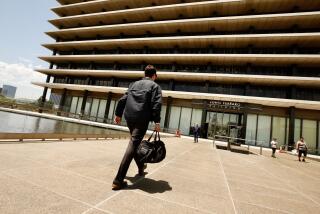Mayor Garcetti’s DWP test
- Share via
The labor agreement announced last week by Mayor Eric Garcetti, members of the City Council and representatives of the union representing Los Angeles Department of Water and Power workers is the result of talks begun more than a year ago. Those talks came about, months ahead of schedule, because of a conviction by city budget staff that salary, pension and healthcare costs had to be brought under control, and an acknowledgment by the International Brotherhood of Electrical Workers Local 18 that it had to help control them — or face either a backlash at the ballot box or a financially unsustainable city.
As it turns out, there was an early ballot box backlash: The millions of dollars that Local 18 spent to support mayoral candidate Wendy Greuel helped persuade many voters to instead back Garcetti. That put the new mayor — a purveyor of progressive politics and a longtime champion of organized labor, including public sector unions — in the extraordinarily odd position of being the one guy with the most potential to stare down Local 18 at the bargaining table.
So how did he do? And how did he do it?
During the final two weeks of an unusually public discussion and debate over the contract, Garcetti acknowledged that it was the fact of his election that gave the management side whatever additional clout it had at the bargaining table. It was, in other words, the message sent in May by voters more than any sent since then by Garcetti that made a difference.
Garcetti showed that he may stand with, or even behind, angry voters and ratepayers if the tactic suits him. He made an unexpected in-person appearance at a neighborhood council forum to promise a firm stance, and he launched an online signature petition to drum up support. He laid bare his demands, but it was difficult to determine exactly what they were or whether they were achieved.
For example, a salary structure no longer pegged to the cost of living in 2016 will emerge as a win or a loss for the city budget only when we see how the economy is performing at that point. Claimed employee contributions to healthcare costs are especially shadowy; the deal will allow Garcetti to argue that there are indeed such contributions while allowing the other city unions he will sit down with next year to argue that there are not. A focus on work rules is good, but perhaps at least as much the result of news stories as of hard bargaining by the mayor. A new pension tier was already on the table.
Garcetti added some noise, some low-key drama and, it’s important to note, some public attention paid to a matter — a labor contract — that more typically gets wrapped up behind the scenes. It may be a hallmark of Garcetti’s style, or perhaps simply of all Los Angeles politics, that the result is only partly satisfying and yet still, for now, satisfactory.
More to Read
A cure for the common opinion
Get thought-provoking perspectives with our weekly newsletter.
You may occasionally receive promotional content from the Los Angeles Times.










